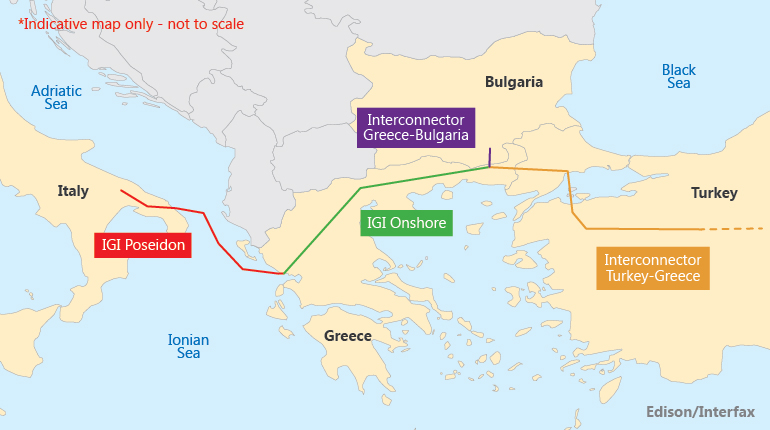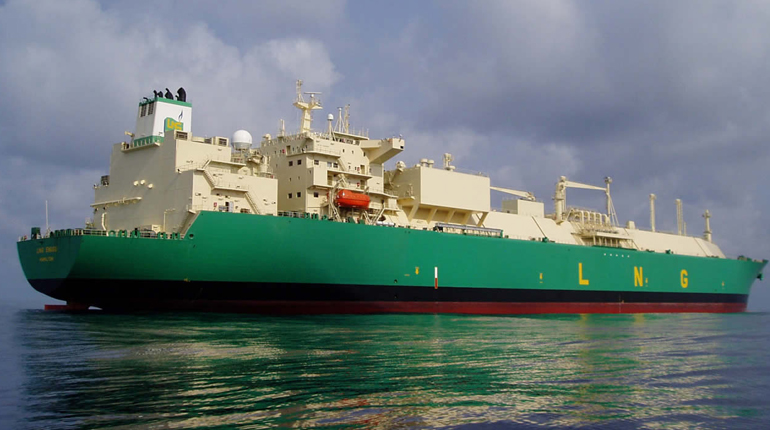 Gazprom’s CEO discussed the possibility of a Black Sea pipeline with representatives from EDF at SPIEF. (Gazprom)
Gazprom’s CEO discussed the possibility of a Black Sea pipeline with representatives from EDF at SPIEF. (Gazprom)
When Russian President Vladimir Putin made an official visit to Greece at the end of May as part of a heavyweight delegation that included Gazprom Chief Executive Alexei Miller, he said plans to supply Russian gas to the EU via new southern export routes were "still on the agenda".
Plans for the Turkish Stream pipeline were put aside after a Russian fighter jet was shot down in Turkish airspace last November, however, and Moscow has been investigating other options.
Speaking on the sidelines of the St. Petersburg International Economic Forum (SPIEF) on Friday, Putin said Russia wants to push ahead with a new pipeline to reach Mediterranean markets. However, he added that, contrary to previous official statements, Russia does not plan to completely phase out shipping gas via Ukraine.
"The only question is how much [gas] we are going to transport and where," Putin told the media late on Friday.
"As concerns our [gas] interest in the Mediterranean area, we haven’t lost it. Gazprom, an Italian [company], and a Greek company have signed a memorandum on exploring options for cooperation. We are considering these options," Putin said.
Gazprom representatives met counterparts from Italy’s Edison at SPIEF to talk about the prospects for a Russian-led pipeline project running under the Black Sea. The results of a preliminary evaluation of the design were the key topic, the Russian export monopoly said.
Gazprom, Edison and Greece’s DEPA signed a memorandum in February covering the future supply of Russian gas through a pipeline under the Black Sea based on the design for the Interconnector-Turkey-Greece-Italy (ITGI) project, which in 2012 lost out in the competition to transit the first 10 billion cubic metres of Caspian gas later this decade.
The project, which was to be a 50/50 joint venture between DEPA and Edison, includes the proposed 207 km Poseidon pipeline, which would run across the Ionian Sea from Greece to southern Italy.
Greco-Italian route
"The project of Russian gas supply to Greece and Italy via third countries is being worked on," Russian Presidential Aide Yury Ushakov said shortly before Putin’s visit to Greece in late May.
"It is planned to lay the gas pipeline on the bottom of the Black Sea and across the territory of a Black Sea littoral state, clearly Bulgaria, to Greece and from there to Italy," Ushakov added.
However, now that the Trans-Adriatic Pipeline (TAP) project is under way, with Italy’s Saipem chosen to build the offshore section, there seems little sense in having a second pipeline running to Italy.
Furthermore, Gazprom is still a prolific supplier to Italy. Last year, the country received 24.42 billion cubic metres of the 130 bcm Gazprom exported to western Europe. This makes the country Europe’s third-largest user of Russian gas, behind Turkey with 27 bcm and Germany with 45.3 bcm.
While the arrival of Caspian gas into Europe will help the EU in its quest to diversify imports away from Russia, its overall impact will be minimal.
Only 10% of the 10 bcm/y of gas from Azerbaijan’s Shah Deniz field is earmarked for Greece and neighbouring Bulgaria – another market dominated by Gazprom – with the rest going to Italy and adjacent market hubs.
Meanwhile, Putin’s statement at SPIEF that Russia is "not planning to fully curtail transport across Ukrainian territory" could be viewed as surprising given Russian officials had previously indicated they planned to stop using Ukraine as a transit country once the current contract expires in 2019. However, Putin also indicated that lack of progress on the Turkish Stream project could keep the Ukrainian transit system active.
Running out of options
Putin was formerly the champion of South Stream – a 50/50 joint venture between Gazprom and Eni that envisaged building a 63 bcm/y pipeline across the Black Sea to Bulgaria and then overland to Greece and the Balkans – until the project was scrapped two years ago in the face of resistance from the EU.
South Stream was replaced by Turkish Stream, which would have been a pipeline of similar capacity that would have linked the Black Sea coasts of Russia and Turkey and then run north from Greece.
There are no obvious alternatives for Russia, although Putin insists that neither project is officially dead.
"There are certain political difficulties with Turkey – this is widely known," Putin told reporters on a recent trip to Israel. "But we have not irreversibly cancelled any of these projects – neither South Stream nor Turkish Stream," he added.
For the first time since the fall of Soviet Union, Gazprom’s market share in southeast Europe faces genuine competition. From 2020 onwards, if all goes to plan, 10 bcm/y of gas from Azerbaijan will be pumped across Turkey to the Greek border and then fed into TAP, which will run west to Albania and then under the Adriatic Sea to Italy.
Construction of the pipeline is now under way and is due to be completed by the end of the decade.
"The energy map of southeast Europe is changing, and Greece is turning into an energy hub for the region," Greek Prime Minister Alexis Tsipras said at the inauguration ceremony at the port of Thessaloniki on 17 May, which was attended by the European Commission’s Vice President for Energy Union Maroš Šefcovic.
However, these are not the words that Russia – which has close political ties with Greece’s ruling Syriza party – wanted to hear. Worse still for Moscow, State Oil Company of Azerbaijan Republic (SOCAR) is preparing to conclude a deal with the Greek government that would give it a large stake in the latter’s gas transmission system operator DESFA, which owns the country’s pipeline grid and also operates an LNG terminal at Revithoussa.
The plan is for SOCAR, which won a Greek tender to buy 66% of DESFA more than two years ago, to acquire 49% of the company, with 17% going to Italy’s Snam Rete Gas. This solution would satisfy the anti-competition authorities in Brussels, which feared a majority stake in DESFA would give SOCAR de facto control of the Greek gas market.
"This has been a very frustrating experience for SOCAR, but they will still want the deal to go ahead", an industry source in Baku with close ties to the company, who wished to remain anonymous, told Interfax.
 Proposed route of the ITGI pipeline.
Proposed route of the ITGI pipeline.Sanctions extended
While Gazprom’s efforts to progress on another southern pipeline route provoked much discussion at SPIEF, it was Ukraine that dominated the agenda in light of the EU’s decision to extend sanctions against Moscow over the annexation of Crimea in March 2014.
Putin’s primary point of interest was on making clear his stance on the dispute between Gazprom and Naftogaz Ukrainy over the 2009 supply and transit contract, which has led the two state-owned companies to seek a solution at the Stockholm arbitration courts.
Naftogaz currently imports gas solely from EU suppliers, claiming the price charged by Gazprom is far higher. While Central European suppliers have rallied in solidarity with Ukraine, Putin argued the case for Russia’s own alternative gas transport route.
"If Ukraine, for instance, understands that it doesn’t have a monopoly over transporting Russian energy resources to Europe, then some figures in that country will stop their blackmail regarding these supplies. We will simply switch to normal business cooperation," Putin said.
"Should Ukrainian partners offer us an economically feasible project today and offer a project that will guarantee both the security of deliveries and economic feasibility, we will work with Ukraine," he added.
"A monopoly is a bad thing, and when someone holds a monopoly in their hands, they immediately start abusing it," Putin said. The Russian president also indicated Russia was not against investing in the Ukrainian gas transport system, with plans in Kiev to dismantle and sell off parts of its integrated gas companies.
"I would like to draw your attention to the fact that we are not in general against considering an option of participating in the Ukrainian gas transportation system," Putin said, although it is thought unlikely Kiev would approve any Russian state investment.
Elsewhere at SPIEF, Miller met Péter Szijjártó, Hungary’s minister for foreign affairs and trade, to discuss the Russian monopoly’s use of the country’s massive gas storage capacity.
Hungary has over 6 bcm of gas storage capacity, but its annual consumption is dropping sharply. Despite this, Russian exports are rising – Hungary imported 15.2% more Russian gas in 2015 than in 2014. Supplies were up by 21.8% year on year between 1 and 15 June 2016.
Although not directly involved in the ITGI revival or Turkish Stream, Hungary’s Prime Minister Viktor Orbán was a supporter of the South Stream pipeline and has been keen to continue cooperation on energy infrastructure projects with Russian companies.
Italy’s Prime Minister Matteo Renzi was also at SPIEF to signal his support for a Russian southern supply route. Sanctions may continue, but Russia is still pushing its own infrastructure projects forward.








Talk to us
Natural Gas Daily welcomes your comments. Email us at [email protected].